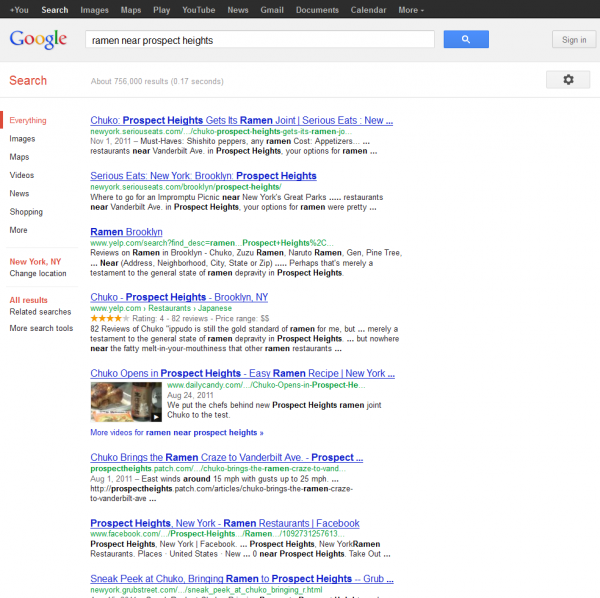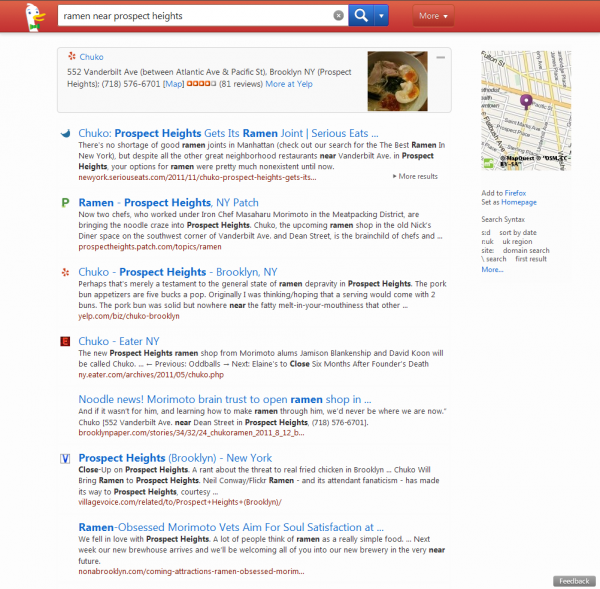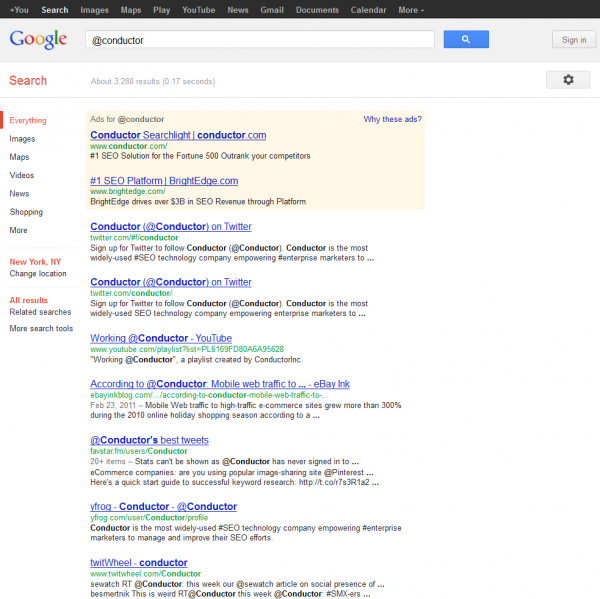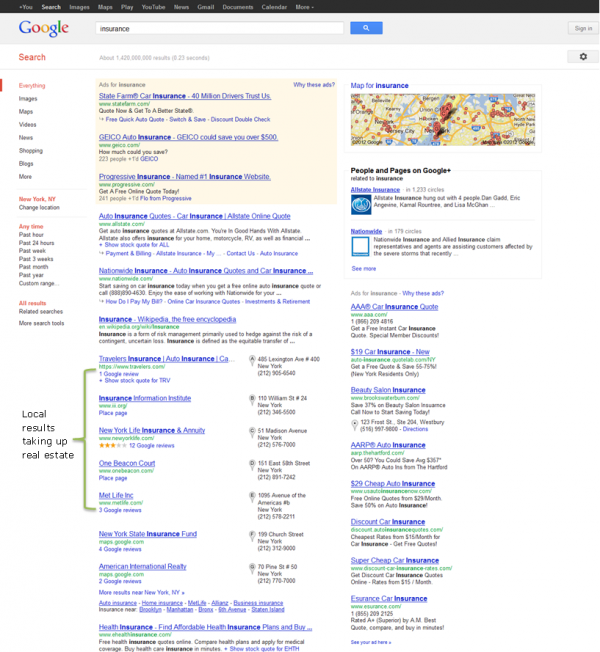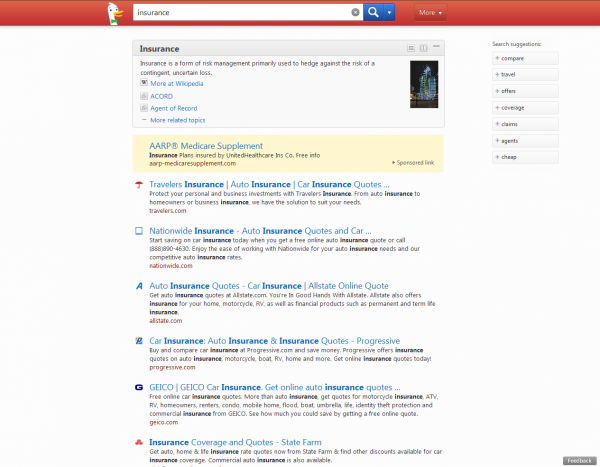Could DuckDuckGo Be The Biggest Long-Term Threat To Google?
Robin Wauters at The Next Web recently wrote about an interesting trend taking place at upstart search engine DuckDuckGo. DDG (DuckDuckGo) is self-described as: We are a search engine with: Way more instant answers. Way less spam and clutter. Lots and lots of goodies. Real privacy. Wauters reports that DuckDuckGo’s daily search traffic has grown by […]
Robin Wauters at The Next Web recently wrote about an interesting trend taking place at upstart search engine DuckDuckGo.
DDG (DuckDuckGo) is self-described as:
We are a search engine with:
- Way more instant answers.
- Way less spam and clutter.
- Lots and lots of goodies.
- Real privacy.
Wauters reports that DuckDuckGo’s daily search traffic has grown by 227% in three months:
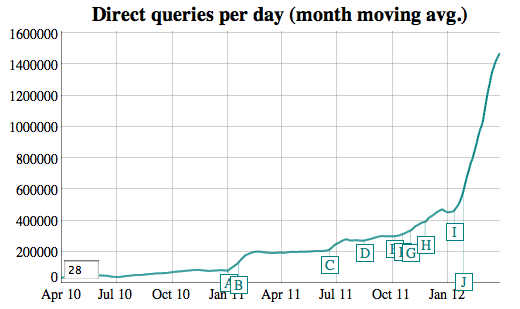
Given their huge growth rate over the last three months we took a closer look at DuckDuckGo to discern why users might recently be turning to it in larger numbers.
The first reason many have pointed to is privacy considerations– DuckDuckGo promises not to track you, and with Google’s frequent and well-publicized privacy challenges many searchers may be looking for alternatives.
So the privacy ‘migrate away from Google’ angle has been well covered and surely is a legitimate argument for why users may be taking a look at Google alternatives. Instead of focusing on that aspect of the DDG phenomenon, I want to focus on other reasons why some of the ways DuckDuckGo is innovating in search might be a long-term threat to Google search dominance.
Before we jump into how DuckDuckGo and Google differ in their treatment of a sampling of queries in the SERPs, it is worth first contextualizing why some of the differences we will call out are meaningful, and also lay the groundwork for what it takes to succeed in consumer search.
Retrieval + Presentation: Like Chocolate & Peanut Butter
We’ve argued before that despite the bells and whistles introduced to the SERPs lately, the core goal of the searcher remains unchanged since internet search first became a reality: to ‘get in and get out’ with the information she is looking for.
Using this standard as a litmus test, we can infer that any reduction in the mental cycles a searcher must invest to extract the information they want from the SERP (what we are calling the ‘search work quotient’) is a positive step forward.
If our measure of success in consumer search, therefore, is that the searcher ‘got in and got out’ with the information she was looking for, there are two distinct competencies a search engine must do well to be considered successful:
1. Retrieval: The search engine must sort through massive quantities of data, weight the relevancy of that data, and determine what is most relevant to addressing the searcher’s query.
2. Presentation: The search engine must organize and present the results in such a way that the user can ‘get in and get out’ with the information she was looking for, with minimal effort.
The two necessarily go together—the most relevant of results presented in an incomprehensible way do nothing for the user, and irrelevant results with good presentation do the same.
Google (and many others in the industry) continue to put great amounts of R&D dollars into making headway on improving relevancy. Surely any engine that is able to make substantial steps forward in this regard would grab their fair piece of the market share pie, but advances since internet search became a discipline in the late 90’s have been more evolutionary than revolutionary (remember Ask Jeeves?).
That leaves ‘presentation’ as an area that even small search upstarts can innovate on, and is one area I’d argue, DDG has begun to beat Google at its own game.
Let’s take a look at some queries to see how DDG has begun to innovate on presentation.
Sampling Of Queries Shows DuckDuckGo Reduces ‘Searcher Work Quotient’
First, a query for the New York Mets schedule: ‘Mets schedule’. Both DuckDuckGo and Google have access to the same information (ESPN) but DDG gives the user the information they are looking for in an immediately digestible format at the top of the SERP.
Meanwhile, Google gives a partial answer in the form of a Stubhub Ad that may or may not persist depending on Stub Hub’s advertisement budget.
Next, a local query: ‘ramen near Prospect Heights’. Like the previous query, Google has access to the same information as DDG (Yelp) but DDG does a better job of prominently presenting the data at the top of the SERP.
The searchers obtaining the same address and rating information for the top restaurant in the search results from Google requires a higher ‘searcher work quotient’ where the searcher must review the SERPs and extract the information from a less-clearly formatted search result.
Another way DDG reduces the ‘searcher work quotient’ via presentation is by including icons next to each search result giving the searcher an idea of the kind of site the search result points to.
For example, the second search result includes a Patch icon, the local news network, telling the user the result is a news page and the second one points to Yelp, the popular review site.
DDG also bests Google in searches for a Twitter account. In another example of DDG reducing the ‘searcher work quotient’, information about the account in question is neatly located at the top of the SERP and the search results are clearly labeled, so the searcher can easily distinguish between a link to Wikipedia and one to Twitter’s home page.
In our final example, our SERP comparison shows that DDG is capitalizing on areas where Google remains weak.
Looking at search results for the high volume query ‘insurance’ we see Google’s SERP is a hodgepodge of advertisements, maps and local results (as though I might be searching for directions to walk from the Conductor offices in the Flatiron neighborhood in New York city to the nearest headquarters of an insurance conglomerate to purchase an insurance policy in person).
By comparison, DDG’s SERP is a clean presentation of search results with limited advertising and no local results, again, with the insurance company’s icon displayed next to the search results.
Google’s Distraction Is DuckDuckGo’s Benefit
The conclusion from our Google – DuckDuckGo SERP comparison for several query types is that DDG is clearly innovating in search ‘presentation’ — an area that has arguably decayed over the years as the large search engines rush to cram ever more (images, video, local, advertising, social…) into the search results.
Specifically, DDG has successfully reduced the ‘searcher work quotient’, improving on the ‘get in and get out’ standard. With negative publicity around Google’s recent changes that have not always been described as a positive step forward for the SERPs, one could easily argue that there is pent-up consumer demand for just such a change.
To be sure, even with DDG’s meteoric growth in the last three months to 1.4 million queries per day, the volume of queries they handle is still a rounding error of a rounding error for the volume of queries that Google handles. And, one could argue that many of the innovations DDG is making could easily be replicated with Google’s engineering might.
But in using DDG, perusing their search results, and in reading their statements on how they handle privacy one can’t help but be left with the impression that they are building their product with a laser-like focus on what is best for the searcher, while other big search players might, well, be distracted by other motivations.
So imagine, several years from now, the product that has evolved out of “we have to diversify outside of search!” thinking vs. a product that continues to evolve from a laser-like focus on “what is the search experience that is uncompromisingly best for the searcher?” and we can begin to imagine a scenario where DDG poses a threat to Google’s search dominance.
I think commenter Mike Vincenti said it best in summarizing the potential threat DDG poses to Google in his comment on the Next Web article:
Contributing authors are invited to create content for Search Engine Land and are chosen for their expertise and contribution to the search community. Our contributors work under the oversight of the editorial staff and contributions are checked for quality and relevance to our readers. The opinions they express are their own.
Related stories
New on Search Engine Land


